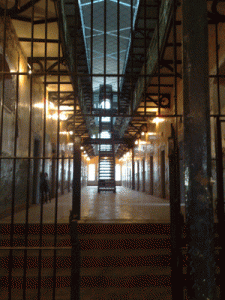 Veteran republican Gerry O’Hare reviews former POW Síle Darragh’s memoir of life for imprisoned women during the struggle for political status:
Veteran republican Gerry O’Hare reviews former POW Síle Darragh’s memoir of life for imprisoned women during the struggle for political status:
It is a grey hulk so familiar to us all. Armagh Women’s Gaol. The very name is redolent of another age. But, it has to be said, mystery still surrounds what it was like to be incarcerated behind its walls. No book has ever been written, to my knowledge, from the perspective of an actual republican woman prisoner. Several have been written by outsiders, albeit sympathetic outsiders, but none by a republican insider.
Until now.
Step up Síle Darragh from Belfast who served a sentence of five years for allegedly planting incendiary devices in a Belfast business. The title appears, at first sight, to be a strange one for a book about the women prisoners in Armagh. There is an explanation but I won¹t spoil it for you. You will have to read on for yourselves.
The book is centered on the struggle of women in Armagh in parallel with the blanket protest and H-Block hunger strikes and focuses particularly on the women’s 1980 hunger strike something that tends to be overlooked when considering the enormity of what was endured by Bobby Sands and his comrades.
Síle Darragh became the OC of the jail after Mairead Farrell, Mary Doyle and Margaret Nugent joined the hunger strike that had been begun by seven men some weeks earlier in the H-Blocks.
Síle’s story begins after she is, firstly, remanded and then sentenced to five years for membership of the IRA – the maximum possible sentence for that conviction at the time.
Brought to Armagh Gaol she quickly settles into the mundane and boring daily routine of life in prison. She explains how the prisoners followed IRA discipline within the jail walls and under the command of Mairead Farrell (later brutally assassinated by the SAS in Gibraltar).
The minds of mere males cannot even begin to imagine the tough conditions the women of Armagh suffered on the no wash protest. Whilst enduring awful conditions with their excrement on the walls, they also had to contend with the added problem of their monthly periods. I found it difficult to come to terms with what they endured.
Síle recalls vividly the brutal assaults carried out during the protest by the screws and the vicious attacks inflicted on them by the RUC. This all stands as no credit at all to an uncaring prison governor or to the prison doctor at the time. Their behaviour borders on criminal neglect.
The pattern in Armagh was, in many ways, similar to that endured by male prisoners in the Blocks and they suffered for the same number of years, between 1976 and 1981.
Father Raymond Murray, the prison chaplain, emerges with integrity. He is referred to in the book with affection and his efforts to ease the women’s sufferings are well-documented.
Síle writes, as I presume she speaks, with descriptive brilliance. Her work will stand testament to all the women prisoners.
I read the book in one sitting; such is its simplicity and conviction. It is a tale told with compassion and pride. It is a miracle that they all came through it.
I have to say that, with every passing chapter, I was waiting for an explanation for the book¹s title. It comes near the book’s finale. Suffice to say, Síle cursed the late Mairead Farrell at the time the eponymous words were spoken in Armagh. And so did I!
On a separate note I once had the pleasure of meeting the late John Lennon during a trip to New York in 1972 to raise funds for internees. I found Lennon intensely interested in the conflict and the plight of prisoners and their families. The former Beatle was anxious to do whatever he could to help – although proposals for a special concert came to nothing (partially because the frantic onward rush of events at the time did not allow for a consistent follow-up process). At that time Lennon was reluctant to leave the USA, was fighting deportation and feared that if he did leave then the immigration authorities would refuse him re-entry.
This is not a book for the faint-hearted. Republican women will not be alone in squirming at some of the details of the narrative but it is, nevertheless, a worthy testament to what they experienced and suffered and what they endured.
Books are available through the following:
www.amazon.co.uk
‘Beyond The Pale’ in reception area, 5-7 Conway Street, Belfast and/or peter_btp@hotmail.co.uk Tel – 07770811042/02890329646
Republican Merchandising Belfast Ltd., 52/53 Falls Road, Belfast, BT12 4PD, Ireland. Tel [028] 90243371
North Belfast Sinn Féin Bookshop, Teach Carney, 291 Antrim Road, Belfast, BT15 2GZ. Tel [028] 90740817
Sinn Féin Bookshop, 44 Parnell Square Dublin 1, Ireland. Tel [353)] 1 8726100/8726932
An Ceathrú Póilí [Culturlann Bookshop] Belfast, Tel [028] 90322811
Read Ireland book distributors – 048 90438630 and website www.readireland.ie and email gregcarr@readireland.ie




